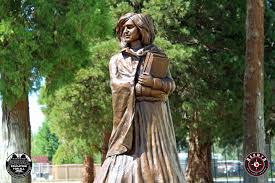
- Details
- By Native News Online Staff
On June 1, 2024, California will mark a historic milestone in its educational history with the “Legacy of Alice” Centennial Celebration. The event will take place in Big Pine, Calif., on the steps of the Big Pine Unified Schools, where a Native American teenager and her peers challenged segregation in schools a century ago, paving the way for equality for American Indian children statewide.
In June 1924, during California’s segregation era, Alice Piper, a 15-year-old from the Big Pine Paiute Tribe, challenged injustice alongside six Native American peers from Inyo County, sparking a legal battle that would take them all the way to the state’s Supreme Court.
Their mission was to enroll in the local public school and challenge discriminatory practices that confined American Indian children to segregated facilities. Despite facing immense opposition and legal hurdles, Piper and her companions persisted in their pursuit of equality, capturing national attention and sparking a legal battle that ended in a landmark victory.
During their legal battle, Piper and her companions brought their case to the Supreme Court of California. Their perseverance paid off when the court ruled in their favor, dismantling segregation barriers hindering American Indian children’s education statewide.
Chief Justice Earl Warren later cited their case as a precursor to the landmark Brown vs. Board of Education decision in 1954.
After Piper’s legal triumph, she dedicated more than 25 years to advancing education at the Stewart Indian School in Carson City, Nevada.
The “Legacy of Alice” Centennial Celebration promises tributes, exhibits, and speeches celebrating Alice Piper’s role in desegregating schools. Attendees will reflect on the progress made since her victory and the ongoing challenges in ensuring educational equity for all.
More Stories Like This
Native News Weekly (August 25, 2024): D.C. BriefsUS Presidents in Their Own Words Concerning American Indians
Indigenous Actor Elaine Miles Reports Detention by Alleged ICE Agents
Happy Thanksgiving from Native News Online
Coming Up on Native Bidaské: Behind the Animation: Joey Clift Talks “Pow” and Native Storytelling
Help us tell the stories that could save Native languages and food traditions
At a critical moment for Indian Country, Native News Online is embarking on our most ambitious reporting project yet: "Cultivating Culture," a three-year investigation into two forces shaping Native community survival—food sovereignty and language revitalization.
The devastating impact of COVID-19 accelerated the loss of Native elders and with them, irreplaceable cultural knowledge. Yet across tribal communities, innovative leaders are fighting back, reclaiming traditional food systems and breathing new life into Native languages. These aren't just cultural preservation efforts—they're powerful pathways to community health, healing, and resilience.
Our dedicated reporting team will spend three years documenting these stories through on-the-ground reporting in 18 tribal communities, producing over 200 in-depth stories, 18 podcast episodes, and multimedia content that amplifies Indigenous voices. We'll show policymakers, funders, and allies how cultural restoration directly impacts physical and mental wellness while celebrating successful models of sovereignty and self-determination.
This isn't corporate media parachuting into Indian Country for a quick story. This is sustained, relationship-based journalism by Native reporters who understand these communities. It's "Warrior Journalism"—fearless reporting that serves the 5.5 million readers who depend on us for news that mainstream media often ignores.
We need your help right now. While we've secured partial funding, we're still $450,000 short of our three-year budget. Our immediate goal is $25,000 this month to keep this critical work moving forward—funding reporter salaries, travel to remote communities, photography, and the deep reporting these stories deserve.
Every dollar directly supports Indigenous journalists telling Indigenous stories. Whether it's $5 or $50, your contribution ensures these vital narratives of resilience, innovation, and hope don't disappear into silence.
 The stakes couldn't be higher. Native languages are being lost at an alarming rate. Food insecurity plagues many tribal communities. But solutions are emerging, and these stories need to be told.
The stakes couldn't be higher. Native languages are being lost at an alarming rate. Food insecurity plagues many tribal communities. But solutions are emerging, and these stories need to be told.
Support independent Native journalism. Fund the stories that matter.
Levi Rickert (Potawatomi), Editor & Publisher

